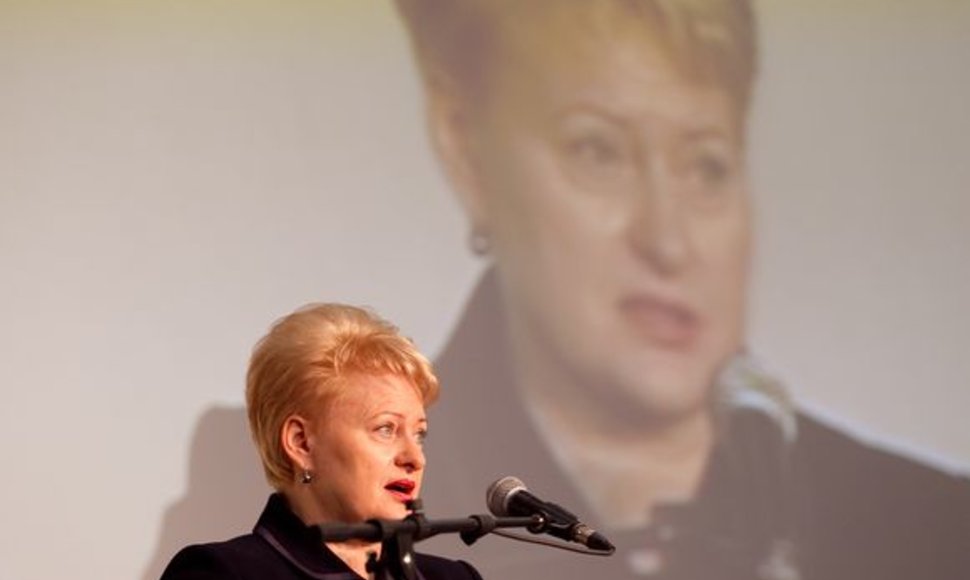According to the poll carried out by public opinion and market research company on 8-21 March, Grybauskaitė remains the country's most popular political figure regardless of a rather sharp fall in popularity.
The president was regarded as the best representative of people's interests by 27.7 percent of those polled in March, indicating a drop by nearly 7 percentage points from February.
Furthermore, the president had favorable reactions from 69.7 percent of respondents this month, down from 80.1 percent from the month before. The number of those having a negative opinion about the head of the state went up by nearly 6 percentage points, from 9.1 percent in February to 15.3 percent in March.
According to the daily, Grybauskaitė supported Raimundas Palaitis, Lithuania's interior minister who resigned earlier this week, after he sacked FCIS director Vitalijus Gailius and his deputy Vytautas Giržadas in mid-February. A large share of the population who supported the sacked FCIS officers then understood the president's crucial role in the story.
Parliamentary Speaker Irena Degutienė of the ruling conservatives saw a rise in popularity over the past month – she was indicated as the best representative of people's interests by 7.5 percent of respondents in March (5.4 percent in February). All in all, Degutienė was viewed positively by 50.4 percent of those polled in March (52.1 percent in February), while 24.7 percent expressed a negative view about her (25.4 percent in February).
MEP Viktor Uspaskich, leader of the opposition Labor Party, ranked third among most popular politicians – 7.1 percent of respondents referred to him as the best representative of their interests (4.2 percent in February). Some 43.6 percent of those polled said they had a positive opinion about him in March, as compared to 40.1 in February. In March, he was viewed negatively by 32.8 percent of those polled, down from 35.9 percent in February.
Next on the list is leader of the Social Democratic Party, MP Algirdas Butkevičius. He was listed as the best representative of people's interests by 5.2 percent of respondents, down from 6.9 percent in February. In March, 40.9 percent respondents said they had a positive opinion about him (41.3 percent in February) and 20.7 percent said they viewed him negatively (23 percent in February).
Conservative leader and Prime Minister Andrius Kubilius ranked fifth, indicated by 4.2 percent as the best representative of their interests in March (3.2 percent in February). He was the worst viewed politician in March, 67 percent of respondents expressing negative views about him, as compared with 69.4 percent in February. He had positive views of 16.6 percent of those polled in March, up from 15.3 percent month-on-month.
Activities of Transport and Communications Minister Eligijus Masiulis, leader of the ruling Liberal Movement, were viewed positively by 37.1 percent of respondents in March, down from 38.5 percent in the brevious month.
First drop in popularity
The popularity of Lithuania's President Dalia Grybauskaitė has been undermined by her stance during the Financial Crimes Investigation Service (FCIS) scandal and her choice to back Interior Minister Raimundas Palaitis, says Vladas Gaidys, head of public opinion and market research company Vilmorus.
Gaidys said this was the first significant drop in the president's popularity, adding it was the lowest rating of public support over her term in the President's Office.
Public trust in the presidential institution also dropped by nearly 9 percentage points from 69.2 percent in February to 60.2 percent in March.
"We can see one reason – the president stood behind Interior Minister Raimundas Palaitis and his decision to dismiss the FCIS officers. The media, nearly all the media, depicted the officers positively. There may have been some exceptions, but the media plays a key role. We see that the number of those having a negative opinion about Algis Čaplikas leader of Liberal and Center Union) who also supported this side went up by nearly 7 percentage points," Gaidys told BNS on Saturday.
In his words, a similar decrease in popularity was observed by former president Valdas Adamkus during his first tenure in the wake of Mažeikių Nafta (Mažeikiai Oil) sell-off.
"This sometimes happens with presidents. For instance, something similar happened with president Adamkus in the 1999 privatization of Mažeikiai Oil, which he had not played a big part in. However, his non-participation pulled down his ratings," the sociologist said.












